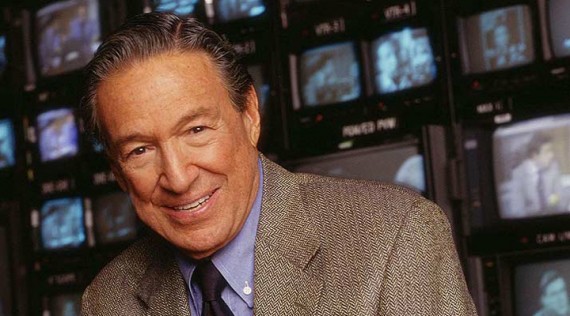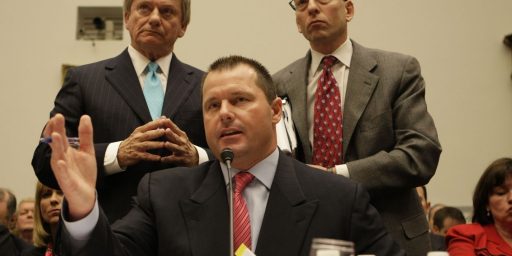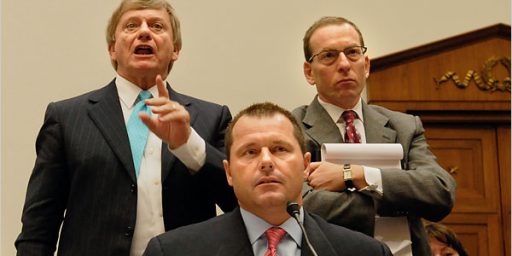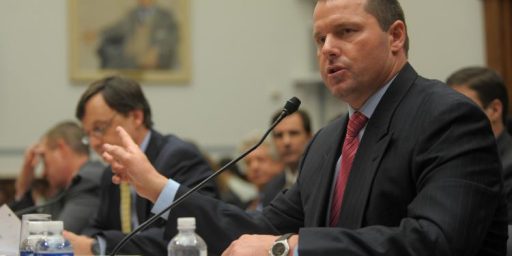Reporter Mike Wallace Dead At 93
CBS News reported this morning that Mike Wallace, who became a star with his confrontational interview style, passed away last night at the age of 93.
From The Washington Post:
NEW YORK — CBS newsman Mike Wallace, the dogged, merciless reporter and interviewer who took on politicians, celebrities and other public figures in a 60-year career highlighted by the on-air confrontations that helped make “60 Minutes” the most successful prime-time television news program ever, has died. He was 93.
Wallace died Saturday night, CBS spokesman Kevin Tedesco said. On CBS’ “Face the Nation,” host Bob Schieffer said Wallace died at a care facility in New Haven, Conn., where he had lived in recent years.
Until he was slowed by heart surgery as he neared his 90th birthday in 2008, Wallace continued making news, doing “60 Minutes” interviews with such subjects as Jack Kevorkian and Roger Clemens. He had promised to still do occasional reports when he announced his retirement as a regular correspondent in March 2006.
Wallace said then that he had long vowed to retire “when my toes turn up” and “they’re just beginning to curl a trifle. … It’s become apparent to me that my eyes and ears, among other appurtenances, aren’t quite what they used to be.”
Among his later contributions, after bowing out as a regular, was a May 2007 profile of GOP presidential hopeful Mitt Romney, and an interview with Kevorkian, the assisted suicide doctor released from prison in June 2007 who died June 3, 2011, at age 83.
In December 2007, Wallace landed the first interview with Clemens after the star pitcher was implicated in the Mitchell report on performance enhancing drugs in baseball. The interview, in which Clemens maintained his innocence, was broadcast in early January 2008.
Wallace was the first man hired when late CBS news producer Don Hewitt put together the staff of “60 Minutes” at its inception in 1968. The show wasn’t a hit at first, but it worked its way up to the top 10 in the 1977-78 season and remained there, season after season, with Wallace as one of its mainstays. Among other things, it proved there could be big profits in TV journalism.
The top 10 streak was broken in 2001, in part due to the onset of huge-drawing rated reality shows. But “60 Minutes” remained in the top 25 in recent years, ranking 15th in viewers in the 2010-11 season.
The show pioneered the use of “ambush interviews,” with reporter and camera crew corralling alleged wrongdoers in parking lots, hallways, wherever a comment — or at least a stricken expression — might be harvested from someone dodging the reporters’ phone calls.
Such tactics were phased out over time — Wallace said they provided drama but not much good information.
And his style never was all about surprise, anyway. Wallace was a master of the skeptical follow-up question, coaxing his prey with a “forgive me, but …” or a simple, “come on.” He was known as one who did his homework, spending hours preparing for interviews, and alongside the exposes, “60 Minutes” featured insightful talks with celebrities and world leaders.
He was equally tough on public and private behavior. In 1973, with the Watergate scandal growing, he sat with top Nixon aide John Ehrlichman and read a long list of alleged crimes, from money laundering to obstructing justice. “All of this, Wallace noted, “by the law and order administration of Richard Nixon.”
The surly Ehrlichman could only respond: “Is there a question in there somewhere?”
In the early 1990s, Wallace reduced Barbra Streisand to tears as he scolded her for being “totally self-absorbed” when she was young and mocked her decades of psychoanalysis. “What is it she is trying to find out that takes 20 years?” Wallace said he wondered.
“I’m a slow learner,” Streisand told him.
His late colleague Harry Reasoner once said, “There is one thing that Mike can do better than anybody else: With an angelic smile, he can ask a question that would get anyone else smashed in the face.”
(…)
Wallace maintained a hectic pace after CBS waived its long-standing rule requiring broadcasters to retire at 65. In early 1999, at age 80, he added another line to his resume by appearing on the network’s spinoff, “60 Minutes II.” (A similar concession was granted Wallace’s longtime colleague, Don Hewitt, who in 2004, at age 81, relinquished his reins as executive producer; he died in 2009.)
Wallace amassed 21 Emmy awards during his career, as well as five DuPont-Columbia journalism and five Peabody awards.
In all, his television career spanned six decades, much of it spent at CBS. In 1949, he appeared as Myron Wallace in a show called “Majority Rules.” In the early 1950s, he was an announcer and game show host for programs such as “What’s in a Word?” He also found time to act in a 1954 Broadway play, “Reclining Figure,” directed by Abe Burrows.
In the mid-1950s came his smoke-wreathed “Night Beat,” a series of one-on-one interviews with everyone from an elderly Frank Lloyd Wright to a young Henry Kissinger that began on local TV in New York and then appeared on the ABC network. It was the show that first brought Wallace fame as a hard-boiled interviewer, a “Mike Malice” who rarely gave his subjects any slack.
Wrote Coronet magazine in 1957: “Wallace’s interrogation had the intensity of a third degree, often the candor of a psychoanalytic session. Nothing like it had ever been known on TV. … To Wallace, no guest is sacred, and he frankly dotes on controversy.”
Sample “Night Beat” exchange, with colorful restaurateur Toots Shor. Wallace: “Toots, why do people call you a slob?” Shor: “Me? Jiminy crickets, they ‘musta’ been talking about Jackie Gleason.”
In those days, Wallace said, “interviews by and large were virtual minuets. … Nobody dogged, nobody pushed.” He said that was why “Night Beat” ”got attention that hadn’t been given to interview broadcasts before.”
It was also around then that Wallace did a bit as a TV newsman in the 1957 Hollywood drama “A Face in the Crowd,” which starred Andy Griffith as a small-town Southerner who becomes a political phenomenon through his folksy television appearances. Two years later, Wallace helped create “The Hate That Hate Produced,” a highly charged program about the Nation of Islam that helped make a national celebrity out of Malcolm X and was later criticized as biased and inflammatory.
After holding a variety of other news and entertainment jobs, including serving as advertising pitchman for a cigarette brand, Wallace became a full-time newsman for CBS in 1963.
He said it was the death of his 19-year-old son, Peter, in an accident in 1962 that made him decide to stick to serious journalism from then on. (Another son, Chris, followed his father and became a broadcast journalist, most recently as a Fox News Channel anchor.)
Wallace had a short stint reporting from Vietnam, and took a sock in the jaw while covering the tumultuous 1968 Democratic convention in Chicago. But he didn’t fit the stereotype of the Eastern liberal journalist. He was a close friend of the Reagans and was once offered the job of Richard Nixon’s press secretary. He called his politics moderate.
One “Night Beat” interview resulted in a libel suit, filed by a police official angry over remarks about him by mobster Mickey Cohen. Wallace said ABC settled the lawsuit for $44,000, and called it the only time money had been paid to a plaintiff in a suit in which he was involved.
The most publicized lawsuit against him was by retired Gen. William C. Westmoreland, who sought $120 million for a 1982 “CBS Reports” documentary, “The Uncounted Enemy: A Vietnam Deception.” Westmoreland dropped the libel suit in February 1985 after a long trial. Lawyers for each side later said legal costs of the suit totaled $12 million, of which $9 million was paid by CBS.
Wallace once said the case brought on depression that put him in the hospital for more than a week. “Imagine sitting day after day in the courtroom hearing yourself called every vile name imaginable,” he said.
His long time colleague Morley Safer has already penned a remembrance at CBS News:
For half a century, he took on corrupt politicians, scam artists and bureaucratic bumblers. His visits were preceded by the four dreaded words: Mike Wallace is here.
Wallace took to heart the old reporter’s pledge to comfort the afflicted and afflict the comfortable. He characterized himself as “nosy and insistent.”
So insistent, there were very few 20th century icons who didn’t submit to a Mike Wallace interview. He lectured Vladimir Putin, the President of Russia, on corruption. He lectured Yassir Arafat on violence.
He asked the Ayatollah Khoumeini if he were crazy.
He traveled with Martin Luther King (whom Wallace called his hero). He grappled with Louis Farrakhan.
And he interviewed Malcolm X shortly before his assassination.
He was no stranger to the White House, interviewing his friends the Reagans . . . John F. Kennedy . . . Lyndon Johnson . . . Jimmy Carter. Even Eleanor Roosevelt.
Plus all those remarkable characters: Leonard Bernstein, Johnny Carson, Luciano Pavarotti, Janis Joplin, Tina Turner, Salvador Dali, Barbra Streisand. His take-no-prisoners style became so famous he even spoofed it with comedian Jack Benny.
It’s hard to believe, but when Wallace was born in 1918 there wasn’t even a radio in most American homes, much less a TV.
As a youth, Wallace said, he was “an overachiever. I worked pretty hard. Played a hell of a fiddle.”
At the University of Michigan, where his parents hoped he’d become a doctor or lawyer, he got hooked instead on radio. And by 1941, Mike was the announcer on “The Green Hornet.”
“My family didn’t know what to make of it – an announcer?” he recalled.
He was soon the hardest-working announcer in broadcasting.
When television arrived in the 1950s, Wallace was everywhere . . . variety shows, game shows, dramas, commercials.
But it was an interview show called “Nightbeat,” first broadcast in 1956, that Wallace remembered fit him like custom-made brass knuckles. “We decided to ask the irreverent question, the abrasive question, the who-gives-a-damn question.”
Some, like labor leader Mike Quill, had never been spoken to that way. “Go ahead and ask your stupid questions,” he retorted.
Neither had mobster Mickey Cohen, whom Wallace asked, “How many men have you killed, Mickey?”
So when “60 Minutes” was born in 1968, Wallace brought with him his “Nightbeat” persona, and contributed 40 years’ worth of nosiness, impertinence, and, of course, drama.
Mike loved to mix it up. With producers, editors, even his fellow correspondents.
As noted, Wallace hasn’t been working in recent years due to declining health. His last interview was with Roger Clemens, who at the time was still defending himself from charges that he had used steroids while playing baseball. From my recollection, Clemens did not stand up all that well to Wallace’s questions at the time. Clemens, of coursei is now facing other legal problems resulting from those steroid allegations.
As I suspect was the case with many Americans, when I was growing up in the 1970s and 80s, 60 Minutes was a regular part of the Sunday evening viewing schedule and, more often than not, it was a Mike Wallace interview that was the highlight of the evening. Considering how many of the great politicians, leaders, and artists of the era that he managed to get to sit down with him, it’s not difficult to understand why.







Wallace was never one of my favorites, largely because I despised “60 Minutes”. The show was the master of the cheap shot and ‘creative editing’. As a forerunner of contemporary media, both left and right, it was a bellwether, but not in a good way.
Wallace was a real reporter…not a stenographer as is the standard today.
And certainly not tha partisan hack that his son is.
Programs like 60 Minutes got me interested in Broadcast Journalism…and I spent 15 successful years doing a job I loved. But the industry changed…and so I left the industry with my pride intact.
May Mr. Wallace R.I.P.
The two above comments say it all about Wallace and journalism–cheap shots & creative editing vs. a real reporter (and not a stenographer or partisan hack)…
I cannot opine about the alleged negative influence that 60 Minutes had on the future of television journalism from its prime. What I can say is that I have been a fairly regular 60 Minutes viewer for a goodly number of years now and the drop off quality since Wallace, and most especially Don Hewitt, left has been massive. There are many a Sunday that i watch the first minute of the show, see that all three segments are fluff and just delete the rest of the show unwatched from my DVR.